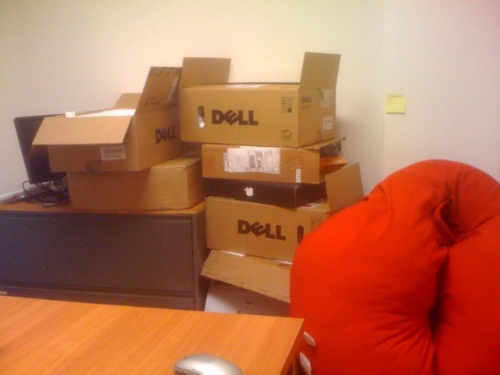I’m spending a lot of time with ad agencies that are scrambling to re-plan major portions of their clients advertising budgets. In short, cutting their TV spend and using that money to do much richer on-line programs than they’ve done in the past. Perfect storm for broadcast and cable TV – Tivo, Dvds, Nintendo Wii, and a writer’s strike. Until yesterday, I never thought of getting rid of my cable. I love a good veg out in the evening after a long day. You won’t catch me telling people to throw out their TV. But could my home be ready for a very different way to get programming from the TV?
I always look at toys like Apple TV as something I add to my “entertainment stack.” I got to thinking about replacing my cable TV subscription with Apple TV. Here’s the math –
My house spends $79 a month on digital cable and we typically rent 2-3 movies on demand for $5 each. Then I pay my cable company $10/month for a DVR. Say $104 a month.
Is there a better way to spend that money?
– Buy an Apple TV for $229 (Say $20 per month)
– Purchase 1 complete season of some TV series every two months – $18/mo.
– Purchase 2 movies a month – $20/mo
– Rent 3 movies per month – $15/mo
– 10 Episodes of Hannah Montana or similar for my daughter – $20/mo.
– Download video podcasts of news programs – free.
Bottom line – I can’t really figure out how I could spend and watch with Apple TV what I’m paying for cable.
What would I miss? A few news programs, Sports programs – especially the Tour de France in July, and a few programs I can’t get (yet) from itunes.
What would I get? Commercial free video. Remove the possibility of me wasting 60 minutes of my life watching a really crappy TV program where I find myself saying “you’re not getting that hour back”
If I’m like even 10% of the American public, advertisers should be rethinking their spend more rapidly than ever before. And the writers should hold out for much better terms for Internet video rights….



